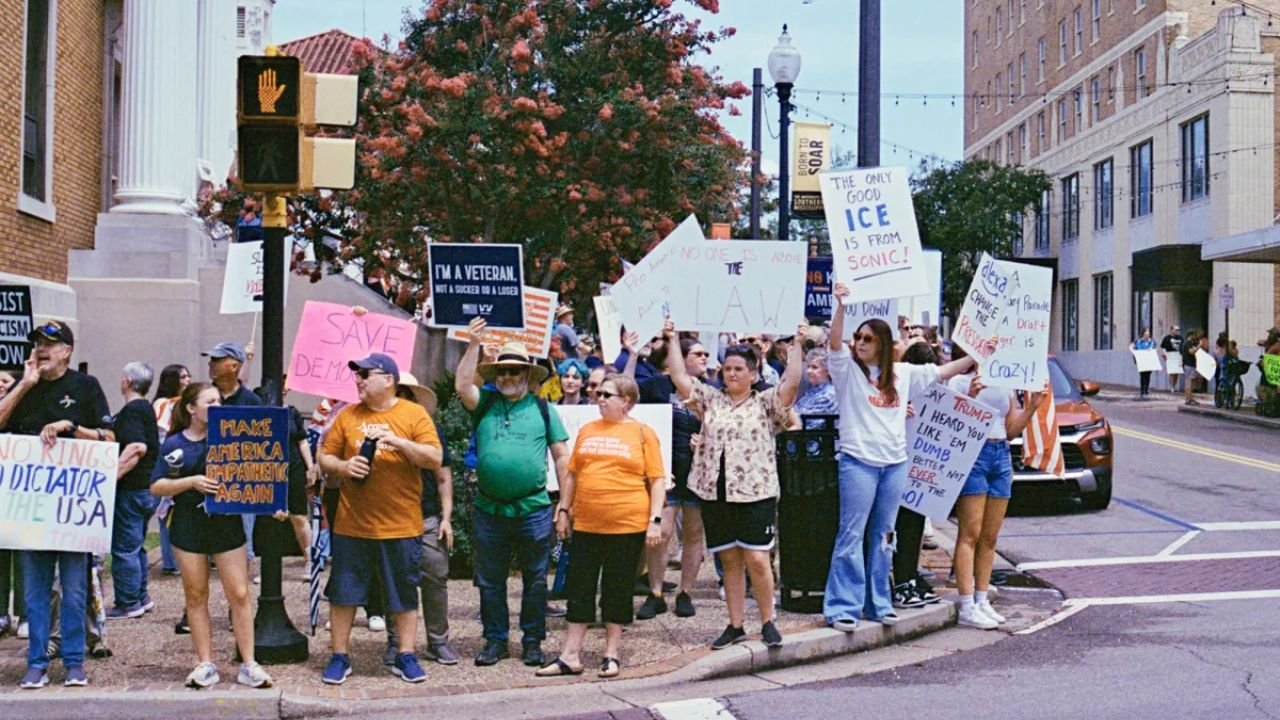Huge crowds are expected to gather across the United States, including eight Mississippi cities, to demonstrate against what organizers describe as authoritarian behavior by President Donald Trump. The event marks the second “No Kings” protest and the third major national movement against the Trump administration this year.
The protest wave comes amid growing tensions between federal law enforcement and demonstrators, reflecting an increasingly divided political landscape.
While conservative figures have criticized the protests as “Hate America” events, supporters frame them as a defense of democracy and freedom of expression.
Mississippi to See Major Turnout
In Mississippi, thousands of participants are expected to march in:
- Corinth
- Gulfport
- Hattiesburg
- Hernando
- Jackson
- Oxford
- Starkville
- Tupelo
During the previous “No Kings” protests in June, between 3,500 and 4,300 people participated across seven cities. This time, Corinth joins the list, raising expectations for an even larger turnout.
Mississippi Protest Schedule — Saturday, October 18
| City | Location | Time |
|---|---|---|
| Corinth | Trailhead Park | 3:00 p.m. – 5:00 p.m. |
| Gulfport | Dan M. Russell Jr. Federal Courthouse Annex | 9:00 a.m. – 11:00 a.m. |
| Hattiesburg | Hattiesburg City Hall | 3:00 p.m. – 5:00 p.m. |
| Hernando | DeSoto County Courthouse Lawn | 2:00 p.m. – 4:00 p.m. |
| Jackson | South Side of the Mississippi Capitol Building | 12:00 p.m. – 1:30 p.m. |
| Oxford | The Square | 11:00 a.m. – 1:00 p.m. |
| Starkville | Old County Courthouse | 12:00 p.m. – 2:00 p.m. |
| Tupelo | Downtown Tupelo | 12:00 p.m. – 1:30 p.m. |
Organizers Push for Political Involvement
Ezra Levin, co-executive director of the nonprofit Indivisible, said the movement responds to what he calls a crackdown on First Amendment rights.
He pointed to sweeping immigration restrictions, threats against press freedom, and attempts to use federal authority for political gain, describing them as direct threats to constitutional protections.
Protests are expected in over 2,500 locations nationwide—from major cities like New York to small towns such as East Glacier Ridge, Montana. Organizers say their main goal is to motivate people to stay politically active long after the rallies end.
Remembering the June Demonstrations
The previous “No Kings” protest took place on June 14, coinciding with a military parade in Washington that critics saw as symbolic of expanding presidential power.
While most gatherings were peaceful, clashes broke out in some cities, and police used tear gas and crowd-control devices to disperse lingering demonstrators.
The June protests also saw tragedy in Salt Lake City, where a safety volunteer accidentally shot and killed protester Arthur Folasa Ah Loo during an altercation. No charges have been filed, though the incident remains a painful memory for many participants.
Utah’s New Approach: Healing Over Conflict
Four months later, Utah organizers have shifted their focus toward unity and healing.
New local leaders, unaffiliated with the earlier protest, plan a peaceful and uplifting event emphasizing community spirit. Volunteers have undergone de-escalation training, will remain unarmed, and participants are urged not to bring weapons.
Given the recent political violence in the state, including the high-profile assassination of a conservative speaker last month, organizers are emphasizing safety and solidarity above all.
Heightened Crackdown on Protests
Since June, Trump’s response to dissent has become increasingly forceful.
He deployed National Guard troops to Washington D.C. and Memphis, and attempted similar deployments in Chicago and Portland, though legal challenges limited those actions.
In Chicago, over 1,000 immigration-related arrests since September have sparked frequent protests. Organizers expect tens of thousands to rally near Lake Michigan before marching downtown.
The Indivisible network and the ACLU have trained participants on their legal rights, de-escalation tactics, and first-aid response. Each protest has a safety plan, including medical volunteers and emergency meeting points.
Mixed Reactions from Political Leaders
Reactions from government officials have been divided.
House Speaker Mike Johnson labeled the rallies “Hate America” events, while Texas Gov. Greg Abbott activated the National Guard and warned that law enforcement would arrest anyone involved in violence or property damage.
Meanwhile, California Gov. Gavin Newsom encouraged residents to participate peacefully, stating that Trump thrives on chaos and that demonstrators should not give him that opportunity.
